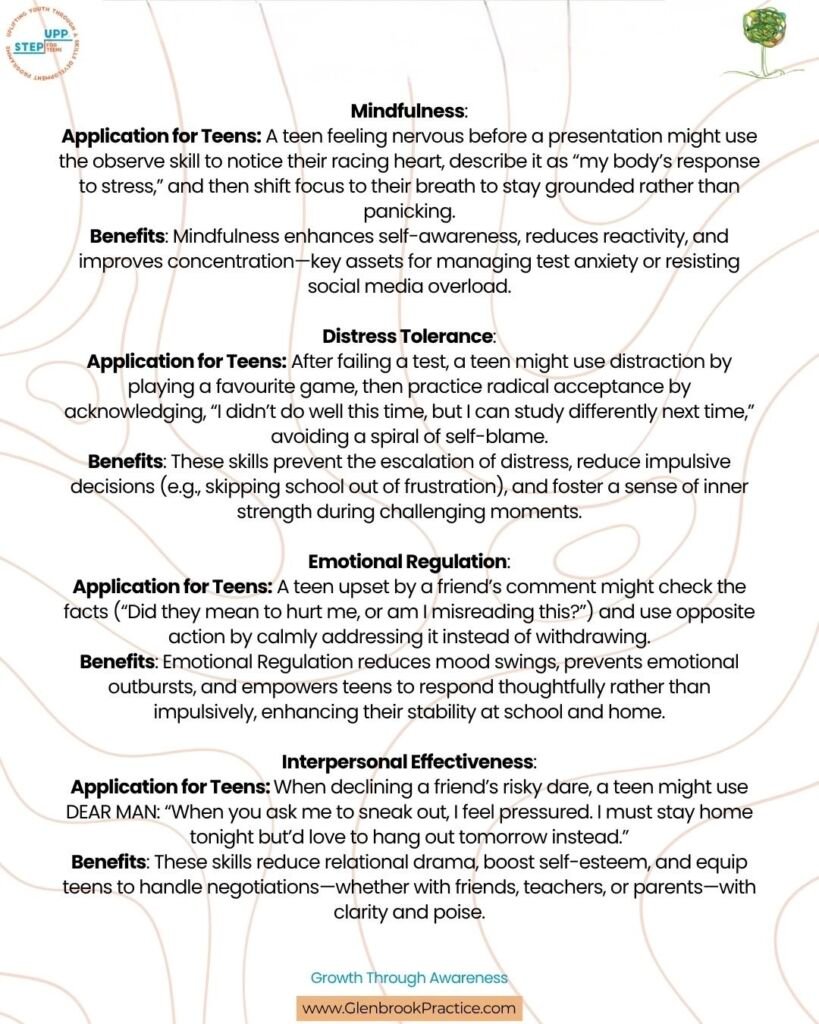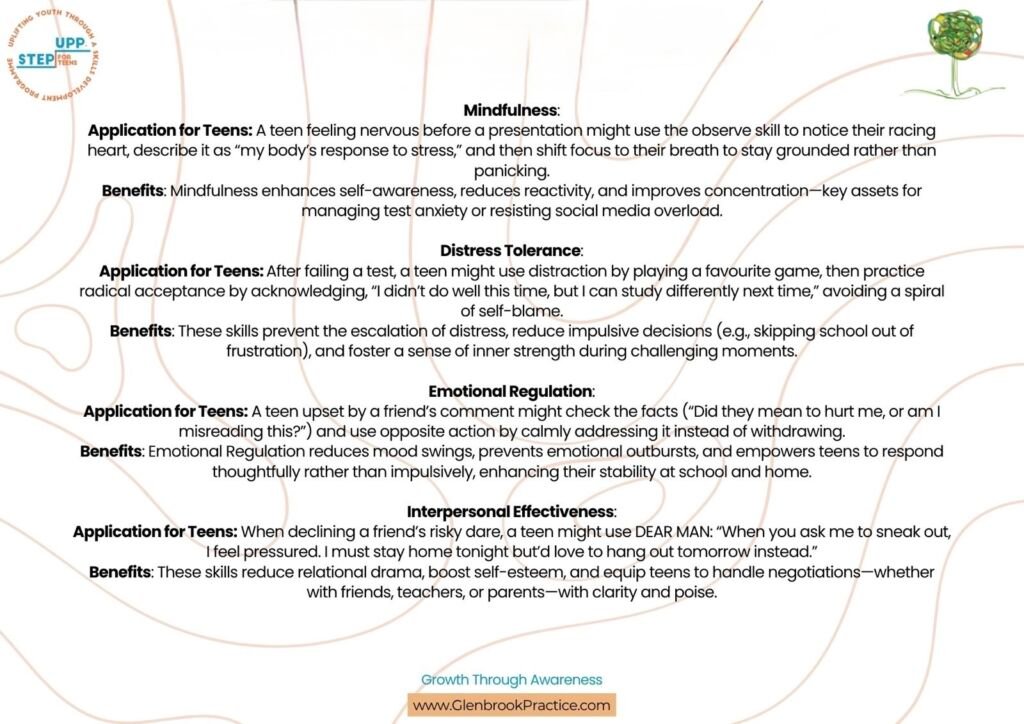the 4 dbt modules for teens
A Comprehensive Approach to Skill-Building
mindfulness
distress tolerance
emotional regulation
interpersonal effectiveness
Mastering life with dialectical behaviour therapy skills
At the core of the Step-upp programme is Dialectical Behaviour Therapy (DBT) Skills, a rigorously researched, evidence-based therapeutic framework designed to address emotional dysregulation and interpersonal challenges.
Originally developed to treat complex mental health conditions, The DBT skills has been adapted to empower teens with a practical, actionable
toolkit for managing the emotional intensity and social complexities of adolescence.
Through 4 interconnected modules — Mindfulness, Distress Tolerance, Emotional Regulation, and Interpersonal Effectiveness — teens acquire skills to navigate their inner world and external relationships with greater confidence and resilience.
Below, each module is explored in detail, emphasising the specific DBT skills taught and their transformative impact on teenage life.
An overview of the 4 dbt modules
Mindfulness
Cultivating Present-Moment Awareness and Emotional Clarity
Mindfulness, the foundational module of DBT, teaches teens to anchor themselves in the present moment, observing their thoughts, emotions, and physical sensations without judgment or impulsive reaction.
This skill is critical for adolescents, who often face overwhelming stressors like academic demands, social dynamics, and self-identity exploration.
Distress Tolerance
Equipping Teens to Endure Emotional Crises
Distress Tolerance provides teens with a structured set of strategies to cope with acute emotional pain without resorting to harmful or impulsive behaviours.
This module emphasises accepting brutal realities while building resilience, making it invaluable for navigating the inevitable setbacks of adolescence, such as rejection or failure.
emotional regulation
Mastering the Art of Emotional Balance
Emotional Regulation equips teens with tools to understand, label, and modulate their emotions, transforming overwhelming feelings into manageable experiences.
This module is essential for adolescents, whose developing brains often amplify emotional responses to triggers like peer conflicts or academic pressure.
interpersonal effectiveness
Navigating Relationships with Confidence
Interpersonal Effectiveness focuses on building communication and relationship skills, enabling teens to assert their needs, maintain boundaries, and resolve conflicts effectively.
This module addresses the social challenges of adolescence, from peer pressure to family tensions, fostering healthier and more respectful interactions.
the key skills in each dbt module
Mindfulness
- “What” Skills: Teens learn to observe (notice experiences without interference), describe (put words to what they notice), and participate (fully engage in the moment).
- “How” Skills: They practice doing so non-judgmentally (letting go of “good” or “bad” labels), one-mindfully (focusing on one task at a time), and effectively (prioritising what works).
- Practical Techniques: Exercises like the “Five Senses Check” (noting five things they see, four things they hear, etc.) or mindful breathing (focusing on slow, intentional breaths) are introduced.
Distress Tolerance
- Crisis Survival Techniques: Teens learn distraction (shifting attention with activities like music or exercise), self-soothing (engaging the senses with comforting actions like a warm shower), and improving the moment (using imagery or positive self-talk).
- Acceptance Skills: Radical acceptance (fully acknowledging reality without resistance) helps teens stop unproductive fighting against what cannot be changed.
emotional regulation
- Understanding Emotions: Teens learn to identify triggers, recognise bodily cues (e.g., clenched fists signalling anger), and understand the purpose of emotions (e.g., fear as a protective signal).
- Regulation Strategies: Techniques include opposite action (acting contrary to an emotion’s urge, e.g., socialising when feeling sad), checking the facts (evaluating if the emotion fits the situation), and building positive experiences (proactively engaging in enjoyable activities).
interpersonal effectiveness
- DEAR MAN: A structured assertiveness technique—Describe the situation, Express feelings, Assert needs, Reinforce the request, stay Mindful, Appear confident, and Negotiate as needed.
- GIVE: A relationship-maintenance strategy—be Gentle (avoid harshness), act Interested (listen actively), Validate (acknowledge others’ feelings), and use an Easy manner (stay
approachable). - FAST: For self-respect—be Fair, avoid Apologies unless warranted, Stick to values, and be Truthful.
Real life examples and benefits


Transformative Benefits for Teens: A Lifeline for Adolescence
The integration of these four DBT modules creates a robust framework for personal growth:
Mindfulness
builds a calm, focused mind, countering the chaos of teenage life.
Distress tolerance
offers a lifeline during crises, promoting resilience over despair.
emotional regulation
provides mastery over emotional waves, fostering stability and self-control.
interpersonal effectiveness
strengthens social bonds, reducing isolation and conflict.
Together, these skills empower teens to feel in command of their emotions and relationships, significantly lowering stress levels and boosting confidence. Whether facing a challenging exam, a falling out with a friend, or the pressures of growing up, teens emerge from the Step-upp programme equipped with a versatile skill set that supports them through adolescence and into adulthood.
